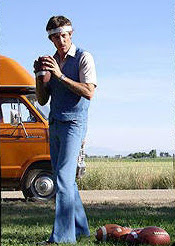- Read and annotate “How to Tell A True War Story” and “The Dentist,” pp. 67-88 (21). (See the post from 11.9 for annotation expectations.)
- Post your answers to the following:
- Explain the quotation: “I survived, but it’s not a happy ending. I was a coward. I went to the war.” Use textual evidence to support your answer.
- Who is the narrator? (The answer “Tim O’ Brien” is insufficient in and of itself.)
11.17.2007
Homework for Monday, 11.19.
Subscribe to:
Post Comments (Atom)






8 comments:
1. When Tim talks about being a coward or being brave he explains one of the many angles of the word 'brave'. Here he is saying he is a coward for not jumping out of the boat and swimming to canada. He says "I think he meant to bring me up against the realities, to guide me across the river and to take me to the edge..." (54)When faced with reality Tim was not brave enough to leave his country and his parents and his friends to swim away from the draft. But it does take courage to sign as a soldier. War never has a happy ending? How can it with so much death. It would not of been happy for tom to swim to canada nor go to war and see death.
2. I think the narrator is every soldier ever to be called by the draft, or sign up. Although it has parts of Tim's personal story, it represents every soldiers feelings, and memories that they cannot express.
John S.
1. Tim is referring to avoiding embarrassment and ridicule by just going to war. He says that going to war is not something you do because you are brave. You do it because you are embarrassed not to. So the only brave thing to do is to not go to war. To face your fear of embarrassment and shame takes bravery, takes "balls", but because it is not glorious, we usually don't think of it as being brave. But yet, in the book the war is not described as glorious and therefore we shouldn't look as going to war as brave.
2. Tim O' Brien is a representative for all the soldiers who went to war without wanting to. All the people that were too embarrassed not to. He represents sight into the unknowns of war. The feelings that are so mysterious to those who have not experienced them. He is a bridge to another world.
Tyler Storlie
The quote "I survived, but it's not a happy ending. I was a coward. I went to war." was a quote, from Tim o'bien, as a 20 year old, trying to dodge the Vietnam war. In his mind it was cowardice not to be able to run to canada. This is contradiction because it is not percieved as cowardice to go to war, but in his mind, he was too much of a coward to run away from his family and loved ones, for what he thought was going to be the best thing for him. This is also contradictory, because earlier in the book he says " Men killed and died, because they were embarrassed not to." (21) He goes onto say that people died as to not die of embarassment. This section is contradictory to the quote, because it shows that people died because they did not want to be known as cowards. So, either way, O'brien was destined to be a coward. He was either a coward, for going to the war, or a coward for not. In the end, he says I survived but it's not a happy ending. That agrees with the statements on pg 21, saying that he should have died, not to die, embarassed, to die a coward. The narrator, is a mix of an immature 20 year-old college student, and a 40 year old vietnam veteran.
Christopher
Erik G
1. He is saying that everyone wants him to go to war, and that he wil be a coward if he does not do what they say. The quote "I did try. It just wasn't possible. All those eyes on me-the town, the whole universe- and I couldn't risk the embarrasement." (59)
2. As the other three have said, Tim represents the typical American soldier who went to the war because of the pressure of society to do it.
1. "I survived, but it's not a happy ending. I was a coward. I went to war." Shows that although some people might think the brave thing would be to go to war he's not being true to himself, which is a cowardly thing to do. "I did try. It just wasn't possible." (59) shows that he wanted to but he folded under the pressure his family and America put on him. He felt that the future of the country was resting on his shoulders. he saw Abraham Lincoln and a girls who died of a brain tumor, he felt that if he didn't go to war he would be disgracing Americans, but really he would be disgracing himself. he didn't believe in the war he thought the war had "uncertain reasons" (40) and didn't want to participate in it becasue it was against his morals. The pressure made him give in, going against what he believed in, so he survived, but not the way he wanted to.
2. I think the narrorator is Tim O'Brien who represents the views of all the slodiers in his brigade. He brings a sense that the war was pointless and they were jsut there because they had to be. I think all the soldiers agreed with him and he was jsut the person who decided to portray how they felt in a story. I think that he could also represent other soldiers in Vietnam who were in the same position as him, but not all soldiers in all wars because each war has a different situation.
Maddie
I think that this quote means, even though he survived the was he is not happy or proud of what he did. He was against the war because he didn't understand why we were at war in the first place of what we were fighting for. Also when they were over there they did some horrible things like burn entire villages and they had no idea why they did that. And those memories will stay with him for the rest of his life. The reason why he says i was a coward was because he actually went to Vietnam even though he didn't want to.
The narrator is Tim O' Brien. But he is telling the story from different perspectives. For example in the chapter "Rainy River" he is a scared and confused teenage boy. Then in most of the rest of the book he is telling the story as a solider in the war. Also in "love" he is telling as a war veteran looking back at the war.
Andi Foss
Jack Pattee
1. He is saying that the only reason that he went to war is so that he could escape the shame of deserting. He doesn't go to war because he is brave and wants to serve is country, but rather because he is too cowardly to face the ridicule and shame that is a product of deserting. This is demonstrated by the quote: "All those eyes on me - the town, the whole universe - and I couldn't risk the embarrassment" (59).
2. The narrator of the book is every soldier who has gotten drafted into the Vietnam war. This is demonstrated by the fact of how the book is told from the perspective of numerous different soldiers.
Taylor Reed
Tim was first embarrassed to go to the war. Then he felt a sense of fear, making him explain the statement the way he did. "i would go to the war-i would kill and maybe die- because i was embarrassed not to." going through the mental and physical preparation Tim submerged himself into a state of self doubt,fear and shame. He did not know what to do because he was not going against the war or his family or the old man, he was going against himself and did not know if he should sink or swim. "As we live our lives, as we make our choices or fail to make them."
the narrator is not only in the Vietnam war but people in everyday life. Showing how people feel about the country, how different people feel about the war, and how the soldiers felt about everything that happened to them. The narrator represents the soldiers who died in the line of duty, the lieutenants that still to this day feel that they are responsible for their group's death because they drove over a land mine.
Post a Comment